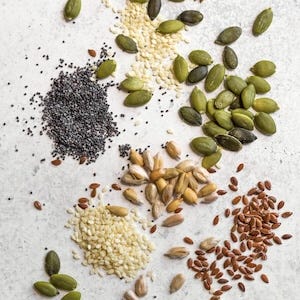How To Take Charge of Menopause (even when you have NO idea what you’re doing)
8 tangible hacks I’ve found that really work!
Let’s say you’re in your forties, and you have a few symptoms that lead you to make an appointment with your doctor. You’re:
Tired
Moody
Gaining weight
Dealing with irregular periods
Having trouble sleeping
You’re only in your forties. You’re too young for menopause, right?
Think again.
I remember sitting in biology class back in high school as the teacher discussed reproduction.
Here are the male parts. Here are the female parts. This is how you make a baby. The. End.
Puberty. That was on the discussion list.
But why wasn’t there a course that took it further?
Why weren’t we given realistic expectations about what to expect in life?
Does anyone know about menopause?
When you have an ache or pain, your doctor is the most natural person to turn to. That’s what yearly checkups are for.
You’re sick and tired of being tired
The mood swings are almost more than you can bear
No matter what you do, you can’t get rid of the extra weight
Irregular periods are impacting the way you live
And you can’t even remember the last time you had a good night’s sleep
So you sit down with your doctor. She’s a family practitioner, or maybe an OB/GYN. Surely, she’s knowledgeable in all things around perimenopause and menopause …
Would it surprise you that very few medical students are trained on menopausal issues at all? According to a NY Times article, medical students may have one hour of training in medical school. Residents from internal medicine, family medicine, and gynecology state they’ve only had one to two hours of instruction. About 20 percent said they had no training at all. And only 7 percent felt qualified in any way to talk with women about menopausal treatment.
I dug a little deeper. A small survey of U.S. obstetrics and gynecology residents found that fewer than one in five receives formal training in menopause medicine, and that seven in ten would like to receive it. It’s not that doctors are against learning about it. It’s that very few programs offer substantial information.
The 2010 US Census estimated that 50 million US women would be menopausal by 2020. The average age of menopause is 51. Considering women live, on average, 85 years, that’s over three decades of life after menopause takes place. Think there are a lot of misunderstood women out there?
Women are underrepresented in all facets of healthcare.
For example, even though heart disease is the leading cause of death in women, they account for less than 40 percent of participants in research studies. Without equal testing, medical treatments for women might not be as safe as for men.
Another report found that in more than 90 percent of case studies, women experienced stronger side effects than men, and experienced adverse drug reactions at nearly twice the rate of men.
I know; I’ve stated a lot of facts. I like to research, and am continually astonished by what I find.
If you’re in perimenopause, or are menopausal, I have one piece of advice for you:
You can’t expect any of your medical team to fully understand what you’re going through. You have to advocate for your own wellness, and not accept “I don’t know” as an answer.
It’s time to TAKE CHARGE of your own wellness.
Let’s add to the confusion
Women are underrepresented in all facets of testing in healthcare. And even when they do test, they often get things wrong.
How do you feel about HRT – hormone replacement therapy?
In 2002, a US-Based Women’s Health Initiate study reported a link between HRT and breast cancer. The results showed the risks far outweighed the benefits, and for years, women wouldn’t even consider these products.
The problem is these test results were skewed. And once again, not a lot of follow-up testing was performed. Women believed it. Doctors believed it. And the negative advice won out.
I’m not advocating for HRT. I’m not a doctor; I’m not offering any advice about your health.
But what I do advocate for is to personally do your own research on hormones, and find out what’s right for you.
Hack #1: Become your own wellness advocate
I feel a lot of people right now are trusting the medical establishment, trusting what they have to say, without really thinking about the final impact on their overall wellness.
Just because someone suggests a treatment, medication, or solution, doesn’t mean it’s right for you.
Sometimes, you have to defend your internal beliefs, ask questions, and move toward another path.
Start by defining what wellness means to you. What does it include? What will you say no to? What will you say yes to? Do you understand your issues and where you stand? Are you willing to walk away from some advice, to seek out something better?
Start by asking: Does this make sense?
My golden rule is: Never accept advice on the spot. I need time to think it through. I need time to do my own research and see what resonates with me.
The medical profession isn’t always right. They’re often biased in many ways - they approach their practice with their belief and education systems in place.
It might not be the best advice for you.
Hack #2: Decide my path
After helping a loved one through his cancer journey, I learned there is a time and place for everything, death included.
Your journey is unique to you. What is it that you really want?
Clarify your journey, and what you hope to gain.
We’ve all read “miracle” stories about how people find extraordinary strength from within, and turn their lives around when they’ve been given bad news. I believe it starts by internalizing where you are, and solidifying your own plan.
Things will go well if you are set with where you’re going.
It’s not always about what other people think you should do.
Sometimes, it’s about taking the road you deliberately choose to travel. Even selecting the right path for the final stages of life permits you to be in the driver’s seat.
This is especially true with menopause. When you find out that the majority of doctors aren’t trained in it, it’s important to trust your gut instincts, and follow a path that resonates within you.
Imagine if everyone had to live with the advice: Live with it. That describes many, many female journeys over the past decades. Luckily, we don’t have to live that way anymore.
What do you want in your life? How do you choose to feel? Now go out and find out how to do it.
Hack #3: Gather the facts
We’re living in a time where people hide facts. Toxic media sources have one belief, and they will ram it down your throat until you walk away.
You’ll never get facts by believing the first thing you read or hear.
Dig deep. Form your beliefs carefully. Then dig a little more.
I’ve changed my mind many times around wellness. Sometimes it’s impossible to ignore the facts once you see them popping up repeatedly.
But other times, one link can open up a wealth of information. It can lead to the biggest a-ha you have in moving forward.
That’s led me in so many directions toward better health. It’s helped me create my resource kit of people I can trust.
Again, I say that what’s right for me might not work for you. Which is why you need to take the time to do your research.
Hack #4: Test, test, test
Years ago, I started learning the importance of vitamin D. I asked my general practitioner to test my vitamin D levels. She stated, “We don’t need to test for that.” It wasn’t necessary in her mind.
But I knew from all my research just how important it was. So I found a way to have the test performed, and found out my numbers were low. (Not unusual, considering most people have low numbers.) I found a new doctor and worked with a holistic practitioner to boost my vitamin D numbers, and I test regularly to ensure they stay in an acceptable range.
It works with hormones too. There are two types of hormone tests, saliva and urine. I work with my holistic doctor yearly to ensure my estrogen and progesterone levels are in check. And because they’ve been consistently low through perimenopause into menopause, I’ve used a plant-based bio-identical hormone program to ensure my levels stay optimal.
Dosage matters. Which is why we review my numbers, and talk about my symptoms. You have to test, not guess. When things need changing, we change them. This isn’t something that’s “one and done.” Instead, we learn, change, and grow depending on what my numbers reveal. It’s about ensuring I’m receiving the proper nutrients to keep my body performing optimally no matter which birthday rolls around.
You can do that too - with the right wellness provider by your side. Ask questions. Find someone who listens. And is willing to help you get the right solutions you can live with.
Hack #5: Find your stress hack
Stress levels change all the time. Just when you think you have something figured out, it’s time to change it up. I found this out firsthand a few months ago.
I had built a routine around so much of my life. I had a good meditation practice, journaled regularly, walked by the river daily, and had a robust exercise routine. I’m plant-based and pay attention to every meal I consume.
But even with that practice, I hit a wall recently that knocked me for a loop. I questioned a lot. Burnout is real.
I found that my stress-reducing habits weren’t doing their job. Everything I did started feeling routine, like I was doing it just to check a box. So I let it all go for a while.
Studies find that people experience stress differently depending on age. And yes, perimenopause and menopause play a role. In general, aging means a more positive outlook on life. It changes our approach.
But that doesn’t mean you can’t experience new levels of stress. And that’s why I chose to let everything go for a bit. I decided to get back in touch with me.
And slowly, slowly add things back in that feel right. I’m still on this journey …
Yes, some of my old routines are important. I can’t imagine not journaling or walking by the river. But the timing has changed. I’m giving myself more flexibility. And I’m crafting a new routine that makes more sense for who I am today.
Hack #6: Read about menopause
I challenge you to become a Google expert. (And maybe an AI/ChatGPT expert.)
Google and ChatGPT can be used to research everything you’re experiencing or having questions about. They should become your friends. (I’m not saying you should believe them 100 percent, but you can use them to introduce you to new ideas.)
Let’s say you are experiencing mood swings.
You can quickly type “mood swings” into Google and find a ton of resources. Chances are you’ll get high-ranking, highly paid medical advice on that first page.
Some of it may be good advice. Chances are, with a lot of it, it’s just more of the same information you’ve found in the past.
Now’s your chance to dig deeper - ChatGPT can really be your friend.
I opened it up and typed: 20 different ways to search for mood swing relief. It gave me a ton of ideas. Including:
Coping strategies for mood swings
Natural remedies for mood swings
Hormonal balance for mood swings
Stress management for mood swings
Mindfulness practices for mood swings
Dietary changes for mood swings
Lifestyle adjustments for mood swings
If one of them captures your attention - lifestyle adjustments for mood swings - you can return to ChatGPT and continue researching. Type in:
I want to further explore: Lifestyle adjustments for mood swings.
Please give me 10 ideas.
It gives me a lot of what you’d expect:
Regular Exercise: Engage in regular physical activity such as walking, jogging, yoga, or swimming to boost mood-regulating endorphins and reduce stress.
Healthy Diet: Maintain a balanced diet rich in fruits, vegetables, whole grains, and lean proteins. Avoid excessive caffeine, sugar, and processed foods, which can contribute to mood swings.
Mindful Self-Care: Engage in activities that promote self-care and self-compassion, such as journaling, hobbies, spending time in nature, or practicing gratitude. Taking time for yourself can enhance emotional resilience and mitigate mood swings.
But even with this, you can start pulling things apart and finding new places to put your energy. I fed into ChatGPT:
I want to spend time in nature to enhance emotional resilience and mitigate mood swings.
Please give me 10 unusual ideas.
Forest Bathing: Practice Shinrin-yoku, a Japanese concept of immersing yourself in the forest atmosphere. Slowly walk through the woods, engaging all your senses to connect with nature deeply.
Stargazing Picnic: Plan a nighttime picnic in a secluded area with minimal light pollution. Spread out a blanket, enjoy some snacks, and marvel at the beauty of the night sky. Consider bringing a telescope for a closer look at celestial objects.
Foraging for Wild Edibles: Take a guided foraging excursion or educate yourself on local edible plants and mushrooms. Safely harvesting wild foods can foster a sense of self-sufficiency and appreciation for the abundance of nature.
Natural Dyeing: Experiment with creating natural dyes using plants, flowers, and other organic materials found in nature. Use these dyes to color fabric or yarn, tapping into the therapeutic benefits of crafting and creativity.
Hmmm… All of this can be done with a few spare minutes. Dig deep and keep trying until you find things that pique your interest. You can go back and forth between the two to do more research, and find sites that help you on different levels.
This has helped me a lot through this latest burnout phase. I’ve used search results to try new things, perform more research, and start a new routine. I dare you to try it and see what you find.
Hack #7: Seed cycling
If you’ve followed any sort of hormonal nutrition advice, you’ve probably seen the concept of seed cycling. People state that seeds have powerful hormonal support properties, and you should rotate them to your diet based on the different phases of your menstrual cycle.
Does it have evidence it works? I’m not sure. But as a plant-based eating advocate, I do know the benefits of adding seeds into your diet any time of the month. So I say … Why not?
Seeds contain high levels of micronutrients and fatty acids that have a positive impact on health. And yes, they can help relieve menstrual cycle and menopause-related symptoms.
Sesame seeds may regulate estrogen and reduce symptoms like hot flashes and night sweats. Flax seeds help with constipation and increase regular bowel movements. Pumpkin seeds offer improved sleep and reduced anxiety from high amounts of magnesium. Chia seeds are one of the best plant sources of fiber, which is essential for estrogen detoxification.
How about nuts? They can be another great source of the good stuff that helps you through menopause. Cashews are high in magnesium, which can help with sleep and relaxation. Brazil nuts are high in selenium, a mineral needed for thyroid hormone production and metabolism. Or maybe you prefer walnuts; they’re rich in antioxidants and nutrients that can help with memory and concentration.
Not everyone can handle nuts and seeds, so it’s important to find which ones work best for you. You can experiment by introducing them slowly into your diet if you don't know.
And use this as your a-ha moment to develop a stronger relationship with your food sources. The more you know about what you’re eating, and how it impacts your body, the more aware you’ll be of making the right choices for your current situation.
Hack #8: Gather support
As you discover new things, some of your new ideas may be far from what others around you believe. If you sway at all from those around you, they’re going to occasionally lash out.
I’ve had people pick fights over my belief in bio-identical hormones and how I handle my wellness. Not everyone agrees with trying to find natural remedies - and that’s okay.
I believe each of us deserves to approach wellness how we see fit. And if someone doesn’t support your decision, find someone who will. Whether it’s a medical doctor, a wellness expert, or even a trusted friend.
You might be surprised at who steps forward and shows you a new path.
I can’t imagine my own menopausal journey without finding a menopause specialist. This isn’t just an average OB/GYN. You can use Google or places like the North American Menopause Society to help you find someone to trust. I also look for naturopathic specialists who focus on hormonal issues. They can help you with hormone tests to measure things like estrogen, progesterone, and testosterone levels, just to name a few.
I also recommend journaling about your experiences, being as specific as you can. This will help your practitioners find better solutions that work for you.
Do you look at yourself as your own wellness advocate?
The only way to move well through perimenopause, menopause, and into your postmenopausal years is to take charge of the process, every step of the way.
Instead of living with it, find ways to reverse it. Search out methods to bring yourself back to wellness, and be the best you can be.
At every age.
It’s possible.
p.s. Did you like this message? It would mean a lot to me if you’d press the ❤️ below if you liked it, left a comment 💬, or shared it with a friend. I’m trying to grow this publication, and I depend on people like you to do so!
And if you’re new here, Welcome! 💐 I’d love to start sharing my message with you if you’re interested in all things plant-powered, proaging, or finding kitchen joy. Subscribe … and then explore my entire archive! Glad to share with you! 🙋🏼♀️













